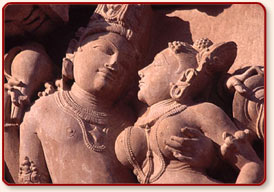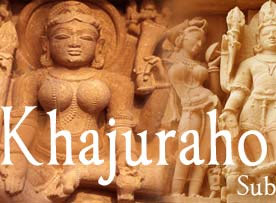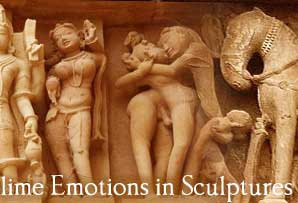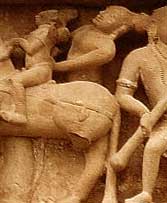 Besides the temples exemplary for their architecture
and bold artistic statement, Khajuraho is just a small modest village
with no more than 3000 residents surrounded by the forestland. As
Khajuraho gets a fair number of tourists from all over the world every
year, hotels, restaurants and souvenir shops have sprung up in large
numbers at the entrances to the two distinctive groups of temples here.
Aeroplanes are not a thing of curiosity for the villagers anymore and
the emblem of a warrior fighting a lion single-handedly and with his
bare hands seen frequently at the temples is said to be the depiction of
the valiant warrior-king who was the head of the clan of the Chandela
Rajputs who built the temples. Chandelas are believed to be the
descendants of the Moon God himself. The construction of the temples is
said to have started in the mid- 9th century and continued until the
early 12th century and due to the lack of records of the building
activity, the names of the thousands of sculptors, architects and
masons, who must have contributed in their construction has been lost
forever into obscurity.
Besides the temples exemplary for their architecture
and bold artistic statement, Khajuraho is just a small modest village
with no more than 3000 residents surrounded by the forestland. As
Khajuraho gets a fair number of tourists from all over the world every
year, hotels, restaurants and souvenir shops have sprung up in large
numbers at the entrances to the two distinctive groups of temples here.
Aeroplanes are not a thing of curiosity for the villagers anymore and
the emblem of a warrior fighting a lion single-handedly and with his
bare hands seen frequently at the temples is said to be the depiction of
the valiant warrior-king who was the head of the clan of the Chandela
Rajputs who built the temples. Chandelas are believed to be the
descendants of the Moon God himself. The construction of the temples is
said to have started in the mid- 9th century and continued until the
early 12th century and due to the lack of records of the building
activity, the names of the thousands of sculptors, architects and
masons, who must have contributed in their construction has been lost
forever into obscurity. Chandela dynasty had already lost its glory by the time the last temple was completed. Khajuraho was the capital of the Chandelas for a brief period but for most of the part, it was their religious center. However, there have been many theories regarding the sculptures adorning the facades and interiors of the Khajuraho temples. Some of them believe these temples to be centers of tantrik mysticism, which regards sex as an important part of human development and the attainment of the Absolute. Others believe that they were constructed as such to lure men and women back to the family and worldly life, which play an important part in Hinduism, from the austerities preached by the Buddha that were gaining favor with people of that time. Since thick forests surrounded these temples thus shielding them from the Muslim armies. T. S. Burt, the British engineer who re-discovered the temples in the mid-19th century found the sculptures offensive. However, the local villagers and tribals have regularly used the temples ever since they were constructed, especially, the temple of Matangeshwar Mahadev for worshipping. It was General Alexander Cunningham who worked hard to gather details about them for the first time in his Survey of India reports. It was his efforts that stirred interest in people about the place. Later, the roads were constructed, facilities were provided for and luxury hotels were planned here and thus, started the resurrection of Khajuraho.









